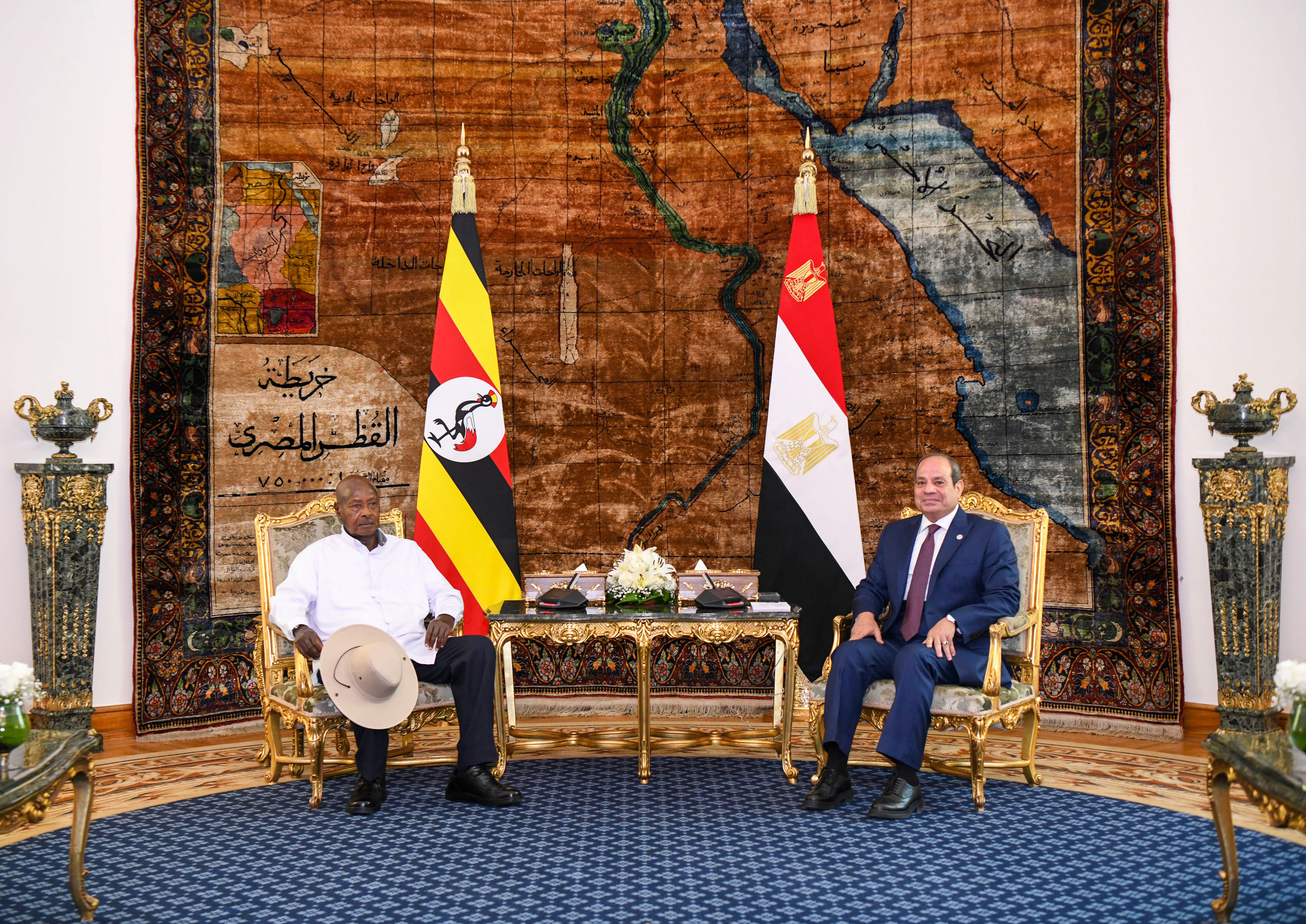PRESIDENT MUSEVENI URGES EGYPT TO INVEST IN UGANDA’S CAPITAL AND ENTREPRENEURSHIP DRIVE
President Yoweri Kaguta Museveni has today called on Egyptian investors to channel capital and entrepreneurship opportunities into Uganda, saying the two countries can transform their centuries-old Nile connection into a powerful engine for economic growth.
Speaking at the Egypt–Uganda Business Forum in Cairo alongside his host, H.E Abdel Fattah El-Sisi, President Museveni declared that his visit was driven by one overriding mission: attracting wealth. The Egypt -Uganda business Forum attracted about 200 participants under the theme: “Strengthening Trade and Investment Cooperation between Uganda and Egypt”. The high-level forum is focusing on five key areas, among which include Business-to-Business (B2B) engagements, Business-to-Government (B2G) dialogues, promotion of joint ventures and strategic partnerships. “I could not come to Egypt without seeking wealth. Egypt and Uganda are linked by the Nile since time immemorial, but our trade is still too small, only $133 million. That does not match our relationship. What we lack, and what Egypt can help us get, is capital and entrepreneurship,” he said. President Museveni explained that capital could come directly from Egyptian sources or through Egypt’s global networks, but the goal remains the same; to inject investment and business acumen into Uganda’s rapidly expanding economy. A Growing Economy Seeking Partners: The President highlighted Uganda’s economic progress, noting that it had recently moved into the low middle-income bracket. “We are no longer among the least developed countries,” he said. “Our economic growth is the result of careful packaging of philosophy, ideology and the economy but we need reinforcement just as investors from India and China have helped us, Egypt too can join in and benefit.” He reminded business leaders of the basics of production. “Business is about goods and services you don’t trade in words. You need land, labour, capital and entrepreneurship. Uganda has abundant land, fertile soils, fresh water, minerals and fisheries. We have a growing labour force, 46 million people today in Uganda, projected to be 106 million in the next 25 years. What we are looking for is more capital and entrepreneurship to unlock this potential.” President Museveni warned that production without a ready market leads to failure. Drawing lessons from history, he recounted his efforts to persuade Japan to assemble vehicles in Uganda. “They ignored us then. Now we manufacture our own vehicles, with only the lithium batteries imported. Those who missed the early chance missed a golden opportunity. The power of the pocket is crucial. Someone who buys from you is helping you.” The President linked this to Africa’s need for unity and market integration. “Our leaders realised, two decades after independence, that without a united African market, we would never get out of poverty. That is why we built COMESA, the East African Community, and now the African Continental Free Trade Area. I am glad Egypt joined COMESA. But first, let us work bilaterally, Uganda buying from Egypt, and Egypt buying from Uganda then we shall engage the rest of Africa.” He cautioned against political and economic fragmentation. “Latin America has more natural resources than the United States, yet people walk on foot to the US because of misery. Why? Because it is disorganised. The US succeeded because its leaders united 13 colonies into a single market. Shall we build a United States of Africa, or a fragmented Africa like Latin America?” he said. President Museveni also thanked President El-Sisi for agreeing to build a foot-and-mouth disease vaccine factory in Uganda. On his part, President El-Sisi reaffirmed Egypt’s commitment to deepening trade and investment ties with Uganda. “It gives me pleasure to welcome my brother, the President of Uganda. We see Uganda as a main partner in the Nile Basin and are keen to expand our trade beyond the current $133 million. This forum is a great step towards our shared goals,” President El-Sisi said. Egypt’s Minister of Investment and Foreign Trade, Hassan El Khatib, welcomed participants by highlighting the strong relationship between Egypt and Uganda, noting that both nations are working toward the same vision of prosperity for their citizens and the African continent. “This forum represents a new chapter in our cooperation,” Mr. El Khatib said, emphasizing that Egypt and Uganda share a common outlook on advancing industries, harnessing human resources, and creating more partnerships, particularly in agriculture and transformational industries. He cited Egypt’s recent successes in infrastructure, especially railways, power plants, and modern agricultural systems as proof of what collaborative effort can achieve. “Our engagement today is about integration and collaboration on the international economic map. Together, we can drive sustainable development, stabilize our economies, and strengthen intra-African trade, with the African Continental Free Trade Area as a key pillar,” he added. Uganda's Minister of Finance, Planning and Economic Development, Hon. Matia Kasaija, echoed the sentiment, recalling that in May 2018, both countries agreed to deepen bilateral relations and build private-sector partnerships rooted in trade and investment. “I am pleased to see that our discussions have matured into this business forum,” Hon. Kasaija said. “It is encouraging to witness the growing trade between our two countries, which reached $138 million in 2024. Egypt’s exports to Uganda rose to $112 million, while Ugandan exports are also growing but this is still below our potential.” He pointed to Uganda’s vast opportunities in cassava production, dairy products, and other agricultural sectors, urging Egyptian companies to invest in the country’s value-addition industries. Hon. Kasaija expressed confidence that the Memoranda of Understanding (MOUs) signed during the forum would open new opportunities for cooperation in various sectors. “This forum gives our private sectors a platform to network, create partnerships, and turn potential into real economic transformation,” he said.12 August 2025


